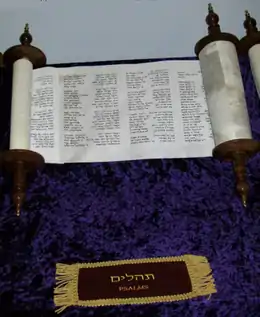Psalm 32
Psalm 32 is the 32nd psalm of the Book of Psalms. In the Greek Septuagint version of the bible, and in its Latin translation in the Vulgate, this psalm is Psalm 31 in a slightly different numbering system.

In Psalm 32 the Psalmist (traditionally, King David) expresses the joy of being released from great suffering. It is divided into two parts: verses 1-5, the psalmist proclaims the joy of seeing his fault remitted by God and in verse 6 to verse 11, he shows his confidence in the fact that God is the guide on the right path.
The harm suffered by the psalmist is very hard to bear, although we can not know precisely its nature. The Psalm seeks to understand where it comes from, because at the time, misfortune is understood as a consequence of the sins one has committed. But far from being an opportunity to revolt, this event leads him to experience God's forgiveness.
Structure
This Psalm is one of the seven penitential psalms, as its focus is on the former sins of the psalmist. The psalm itself is not a prayer of repentance, but a confession of sin is consummated. It also touches on themes of wisdom poetry, and belongs to the series of psalms of thanksgiving of an individual. According to James Luther Mays, the Psalmist, in the exercise of repentance teaches others of his experience and gives therefore instructions.[1] It is divided into the following segments:[2]
- 1. Verse 1: Commitment to repentance
- 2. Verse 3-5: The psalmist's distress
- 3. Verse 6: Forgiveness and admonition to others
- 4. Verse 8: Wisdom speech
- 5. Verse 10: Summary of experience
- 6. Verse 11: Rejoicing over the forgiveness of sins
Uses
Judaism
- Is recited on Yom Kippur in some traditions.[3]
- Verse 8 is found in the "Foundation of Repentance" recited on the eve of Rosh Hashanah.[4]
Psalm 32 is one of the ten Psalms of the Tikkun HaKlali of Rebbe Nachman of Breslov.[5][6]
New Testament
Paul references verse 1 & 2 of the Psalm in Romans 4:7–8 in his explanation of salvation by faith, not works.[7][8]
Catholic Church
Following St. Benedict of Nursia[9][10] the practice in the Middle Ages, was for monasteries, to recite or sing this Psalm at matins of Sunday.[11] Today, Psalm 31 is sung or recited at Vespers of Thursday of the first week.[12]
References
- James Luther Mays, Psalms (1994), 145.
- Hermann Gunkel, The Psalms (6 1986), 135.
- The Artscroll Tehillim page 329
- The Complete Artscroll Machzor for Rosh Hashanah page 7
- Weintraub, Rabbi Simkha Y. (2018). "Psalms as the Ultimate Self-Help Tool". My Jewish Learning. Retrieved September 25, 2018.
- Greenbaum, Rabbi Avraham (2007). "The Ten Psalms: English Translation". azamra.org. Retrieved September 25, 2018.
- https://www.biblegateway.com/passage/?search=Romans+4&version=NIV
- Kirkpatrick, A. F. (1901). The Book of Psalms: with Introduction and Notes. The Cambridge Bible for Schools and Colleges. Book IV and V: Psalms XC-CL. Cambridge: At the University Press. p. 838. Retrieved February 28, 2019.
- Règle de saint Benoît, traduction de Prosper Guéranger, p. 46, Abbaye Saint-Pierre de Solesmes,
- http://www.abbaye-montdescats.fr/?page_id=1887
- Psautier latin-français du bréviaire monastique, p. 89.
- The main cycle of liturgical prayers takes place over four weeks.
Further reading
- John Barton, John Muddiman (eds.), The Oxford Bible Commentary, Oxford University Press, 2001, p. 377.
External links
| Wikimedia Commons has media related to Psalm 32. |